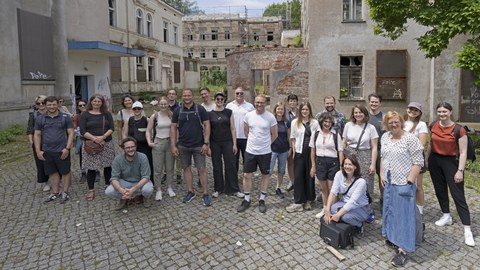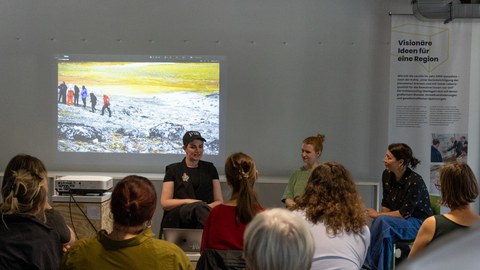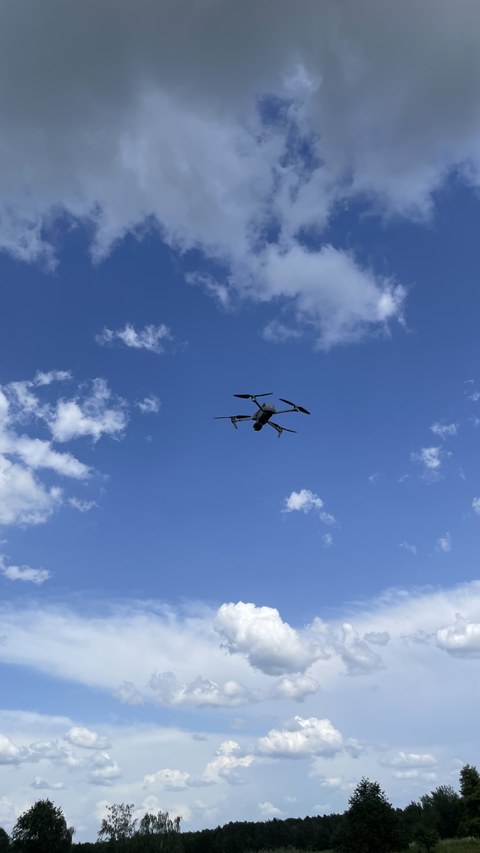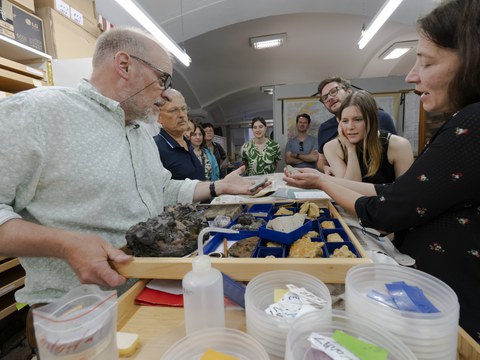03.09.2024
Von arktischen Kipppunkten und Lausitzer Tiefenbohrungen: Erste Erkundungen des Schaufler Kollegs zu Daten↔Welten

Schaufler Lab meets Deutsches Zentrum für Astrophysik (DZA), Kahlbaum-Areal, Görlitz
Das Schaufler Kolleg@TU Dresden startete im April 2024 in seine zweite Förderphase. Unter der Leitung der Sprecher:innen Moritz Ingwersen und Orit Halpern sowie der Postdoktorandin Özgün Eylül Iscen nahmen sieben Promovierende ihre Dissertationsprojekte zum neuen Leitthema Daten↔Welten auf. Neben einem regelmäßig stattfindenden Forschungskolloquium, das im ersten Semester durch intensive, interdisziplinär angelegte Textlektüre und -diskussion zur Leitthematik geprägt war, fanden erste Austauschformate mit der Schaufler Residency sowie Research Studios und Exkursionen statt:
Als Auftakt ihres künstlerischen Forschungsstipendiums an der Schaufler Residency@TU Dresden traf Mitte Mai die Konzeptkünstlerin Lena von Goedeke auf die Literaturwissenschaftlerin Svenja Engelmann-Kewitz, TU Dresden.

Lena von Goedeke und Svenja Engelmann-Kewitz diskutieren "Kipppunkte" im COSMO-Wissenschaftsforum.
Unter dem programmatischen Motto „Kipppunkte“ diskutierten die beiden Forscherinnen, die sich seit Jahren aus künstlerischer resp. literaturwissenschaftlicher Perspektive mit der Transformation des polaren Nordens auseinandersetzen, im COSMO im Kulturpalast Dresden die Bedeutung der Arktis im Kontext von Klimakrise und extremen Zukünften.
Die im Publikum mitdiskutierenden Doktorand:innen des Schaufler Kolleg konnten diesen ersten Dialog zur Forschung Lena von Goedekes bald intensivieren. Hierzu verlegte Mitte Juni das Kolleg die Sitzung des Forschungskolloquiums zum Thema „Sensing Data Environments“ kurzerhand in das Berliner Studio der Künstlerin. So verband sich auf fruchtbare Weise eine kulturwissenschaftlich geprägte Lektüre mit einer Führung zu den aktuellen Forschungsarbeiten Lena von Goedekes, die sich mit den Potenzialen und Herausforderungen verschiedener Remote-Sensing-Technologien innerhalb der Arktis-Forschung beschäftigt, wobei die Künstlerin auch selbst Drohnen zur Auslotung ihres Forschungsgegenstandes einsetzt.

Zu Besuch im Berliner Atelier Lena von Goedekes
Eine kurze Demonstration dessen konnte das Schaufler Kolleg auf seiner zweitägigen Exkursion nach Görlitz und in die Oberlausitz erleben, die Ende Juni stattfand. Den Mittelpunkt dieses Ausflugs in die Feldforschung bildete der Besuch des sich im Aufbau befindlichen Deutschen Zentrums für Astrophysik in Görlitz, ein 2022 initiiertes und seit 2024 entstehendes Großforschungszentrum für astrophysikalische und astronomische Forschung und damit verbundener Technologieentwicklung. Unter der Leitung von Astrophysiker und Wissenschaftskommunikator Dr. Stefan Ohm und in Begleitung weiterer Wissenschaftler:innen des DZA startete die Exkursion zunächst mit einer Führung Daniel Breutmanns vom Verein goerlitz21 e.V. durch den zukünftigen Standort des DZA in Görlitz, dem Kahlbaum-Areal. Der heutige „lost place“ wurde im 19. Jahrhundert vom Mediziner und Therapeuten Dr. Karl Ludwig Kahlbaum als Nervenheilanstalt gegründet und als psychiatrische und medizinische Einrichtung genutzt, bevor das Gebäudeensemble 2002 leergezogen wurde. Im Anschluss fuhr die Exkursionsgruppe per Autokorso in das Oberlausitzer Ralbitz-Rosenthal, zur Besichtigung der Bohrstelle für ein vom DZA geplantes Untergrundforschungslabor, das Low Seismic Lab.

Bohrlochmessungen am zukünftigen Low Seismic Lab des DZA in der Oberlausitz
Der unterirdische Granitstock der Oberlausitz bietet laut DZA hervorragende Bedingungen für die Entwicklung von neuen Mess- und Produktionstechnologien und neuartigen Gravitationswellendetektoren. Die bereits erreichte Tiefe der Probebohrungen von über 200 Metern wurden sogleich durch einen von Lena von Goedeke gesteuerten Drohnenflug übergeprüft. Schaufler Kolleg und DZA-Mitarbeitende diskutierten an Ort und Stelle über die Verflechtung von neuen Hochleistungstechnologien und Datenströmen mit dem gesellschaftlichen und kulturellen Transformationsgeschehen in postindustriellen Landschaften wie der Oberlausitz. Der Besuch des Senckenberg Museums für Naturkunde Görlitz am zweiten Exkursionstag knüpfte daran an: Dr. Olaf Tietz, Sektionsleiter für die geologischen und paläobotanischen Sammlungsbestände des Museums, gab Einblick in die Geschichte und Beschaffenheit des Oberlausitzer Granitstocks, in mögliche Bohrtiefen und paläontologische Funde aus den ehemaligen Tagebaugebieten. Zusammen mit den astrophysikalischen Zielsetzungen des DZA ergaben sich für die Exkursionsteilnehmenden des Schaufler Kollegs und der Schaufler Residency gleichsam Daten-Botschaften aus der Tiefenzeit aus zwei Richtungen: geologisch und kosmisch.

Besichtigung der geologischen Sammlung im Senckenberg Museum für Naturkunde Görlitz
Im Anschluss an die Exkursion reflektierten die Kollegiat:innen in ersten kreativen Skizzen ihre Beobachtungen zu den ihnen während dieses Austauschs begegneten vielfältigen Dimensionen von Datenwelten und -praktiken. Die Weiterarbeit an diesen Reflektionen wird den Auftakt des Kolleg-Ausbildungsprogramms im bald startenden Wintersemestersemester 2024/25 bilden.
To be continued ...
